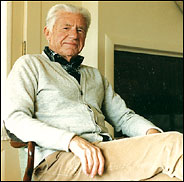Gen-ie-us
 Then, this morning, as I struggled to force myself to get out of my flannel bed-cocoon, I found myself obsessed with trying to remember a three-syllable phantom third term in a catalogue that the cotton industry used as its jingle years ago: "The touch, the feel, the ________ of cotton." Now, I'm thinking that there's probably no third term at all, but while I was half asleep, I ran over and over the jingle, and the best I could do was "genius." But not just any "genius." I'm talking "genius" the way girl bassist Tina Weymouth falsettos it in the Tom Tom Club's "Genius of Love": "He's the gen-ie-us of love" is how it goes. I neglected this song for years--right up until this winter, in fact. I even fast-forwarded past it when I finally got around to seeing the DVD remaster of Demme's Stop Making Sense (1984), on the principle that any spin-off could be no more than the bastard child of the Talking Heads. Ah, how the mighty fall.
Then, this morning, as I struggled to force myself to get out of my flannel bed-cocoon, I found myself obsessed with trying to remember a three-syllable phantom third term in a catalogue that the cotton industry used as its jingle years ago: "The touch, the feel, the ________ of cotton." Now, I'm thinking that there's probably no third term at all, but while I was half asleep, I ran over and over the jingle, and the best I could do was "genius." But not just any "genius." I'm talking "genius" the way girl bassist Tina Weymouth falsettos it in the Tom Tom Club's "Genius of Love": "He's the gen-ie-us of love" is how it goes. I neglected this song for years--right up until this winter, in fact. I even fast-forwarded past it when I finally got around to seeing the DVD remaster of Demme's Stop Making Sense (1984), on the principle that any spin-off could be no more than the bastard child of the Talking Heads. Ah, how the mighty fall.(Perhaps appropriately, given that I've wandered to the Tom Tom Club, a band formed around a rhythm section, and "Genius of Love," a paean to the great funk and soul rhythmists, my house has suddenly started rocking to the beat of roofers who have finally--after a three-month "break"--returned to replace the gutters on my house. First, the old gutters, with their accumulated wealth of probably fifteen autumns and their completely rusted-out bottoms, have to be taken down, and apparently these roofers' strategy is to pound them down. I fully anticipate seeing something come through a wall or a window before this operation is complete. But the condition of my house, and of the gutters in particular, is a story for another time. Meanwhile, my bed is dancing like a quarter-driven Magic Fingers operation.)
 My need to find this missing and possibly non-existent third term from the cotton advertisement--for now, I think I finally remember that I was always dissatisfied with the metrics of that jingle: "The touch... the feel... of cotton" always felt as though it needed more, as though the jingle-writers just gave up and said, "Well, we can just slide on into 'of cotton' and nobody will notice"--finally propelled me downstairs to make my morning coffee, collect some books for coffee-time in-bed reading, and grab the computer for some morning googling. No dice on the jingle. But when I tooled over to The New York Times, I found M. H. Abrams peering sagely out from the book section's sidebar. After 43 years as the general editor of the Norton Anthology of English Literature, Abrams has handed that job over to Stephen Greenblatt, and so yesterday the Times ran a story looking back over his career and the anthology's development.
My need to find this missing and possibly non-existent third term from the cotton advertisement--for now, I think I finally remember that I was always dissatisfied with the metrics of that jingle: "The touch... the feel... of cotton" always felt as though it needed more, as though the jingle-writers just gave up and said, "Well, we can just slide on into 'of cotton' and nobody will notice"--finally propelled me downstairs to make my morning coffee, collect some books for coffee-time in-bed reading, and grab the computer for some morning googling. No dice on the jingle. But when I tooled over to The New York Times, I found M. H. Abrams peering sagely out from the book section's sidebar. After 43 years as the general editor of the Norton Anthology of English Literature, Abrams has handed that job over to Stephen Greenblatt, and so yesterday the Times ran a story looking back over his career and the anthology's development.I remember first finding out who Abrams was. Throughout my first semester at Cornell, I kept seeing this hale and hearty--he really epitomizes the phrase--man walking the corridors. At the beginning of the second semester, he introduced a guest speaker, in his entirely compelling, slightly gravelly basso voice. I would pay to listen to Abrams read the phone book, I tell you. After the talk, my now-temporarily-Floridian friend and I cornered the director of graduate studies and said, "Who was that man?" "Oh," she said, off-handedly as always, "that's Mike Abrams." "Oh," we said. As she walked away, we looked at each other and mouthed, "Mike?!"
His full fiirst name is Meyer. He is 93. You wouldn't know it. You can hear him reading Gerard Manley Hopkins, my favorite poet, here. You will love it.
I would love this post to say something profound about Mike Abrams, but these gutter guys have pounded down my concentration just as resolutely as they have removed the ruined remains of the gutters. And the man outside my window yodels out a few misremembered bars from "The Lion Sleeps Tonight" or practices his auctioneering every once in awhile, generally right after he's hollered an instruction to one of his coworkers. And so I will just tell you this story, which the Times article also tells:
In the 1950s, Abrams received a paper about Candide and Rasselas from a student and was sure it was plagiarized. He called the student in and quizzed him about the paper; within a short time, it was clear that the student acutally had written the paper. The student? Thomas Pynchon.
One of my proudest moments in grad school came when I sat on a faculty panel with Abrams, discussing the history of our department. I had done archival work and talked about the earliest days, the earliest sages. Where I left off, Abrams's institutional memory picked up; his first senior colleagues had known the last people I talked about, and so he could carry us from the early twentieth century up into the time when the next panelists joined the faculty. Star-struck is precisely the word for what I was.
Walking the halls with M. H. Abrams and, in that first year of grad school, A. R. Ammons made everything we were doing seem that much more serious, even sanctified, in large part because of the boundless high and frank good humor of both men. In the halls, and in the mailroom, they were just Mike and Archie, doing their work, being their selves. A revelation.
sources for today's images: 1) An online LP seller; 2) The New York Times.


5 Comments:
I can't at all remember the scene of The Great Abramsian Revelation -- which perhaps isn't so very surprising given the sieve-like behavior of my memory.
But...
"The touch, the feel of cotton: [pause] the fabric of our lives."
If you count the (ahem) post-colonic pause, "the fabric of our lives" contains the same number of beats (feet?) as "The touch, the feel of cotton" -- at least, that's my theory. And not only does the second part thereby balance the first part rhythmically, it does so thematically, as well. The, er, post-colonic material broadens the, um, significance of the cotton by moving away from the earlier pre-colonic material's (presumably local) emphasis on sensation and materiality.
So perhaps the reason why "the touch, the feel of cotton" seemed -- and perhaps still seems -- unsatisfactory is because you were envisioning the phrase as a unit unto itself -- whereas in fact the whole slogan was needed to make the constitutent parts work properly.
It would be like Bennifer without the Jennifer, or the Holy Roman Empire without any Romans, or *Boss Ladies, Watch Out!: Essays on Women, Sex and Writing* without any essays on sex. Can you imagine? *Boss Ladies, Watch Out!: Essays on Women, Sex and Writing* without any essays on sex? It would be quite dreadful.
I will re-tell you the story of the Revelation; suffice it to say that it happened at the same lecture (in the old lounge) where one of our cohort was "uncomfortable" with the visiting speaker's premise and showed that off a lot. He may even have been "deeply uncomfortable."
I think the problem with the cotton jingle is that it had so many pauses. In my memory, anyway, there are pauses after "touch," "feel," and the colon. (I'm deeply uncomfortable, by the way, bahaha.) And I think that I also didn't like--without even realizing it--that the two parts of the jingle scan so irregularly. Pre-colonic: two iambs and an amphibrach. Post-colonic: some weird series of stresses that would be OK if the writer were Hopkins but doesn't work if you're not springing the rhythm. Anyway. The irony here is that I kind of liked the cotton commercials. I think they made me teary sometimes. (Either that or I'm getting myself mixed up with some character on a WB dramedy, or some NBC show, who could be made teary by commercials.)
Cool blog, Dr. S!
I was going to note the important post-colonic phrase but, alas, someone beat me to it.
I don't think I could have said it as well as poking-stick man did, so it's probably better this way.
I don't see how you could dwell at such length on "Genius of Love" and not at least touch on the fact that Mariah Carey prominently sampled "Genius of Love" in not one but two of her dance hits, "Fantasy" and "Heartbreaker."
At this point, it would be your duty to exercise your typically serpentine and yet utterly persuasive and engrossing logic to link Mariah Carey to M.H. Abrams. Which I would really want to read about.
Point taken. When "Genius of Love" was put on my radar in December, it was accompanied by a mention of M.C., but I let that go in the process of learning the song. But perhaps I'll have to do a sequel post--perhaps "The Mariah and the Lamp."
Post a Comment
<< Home